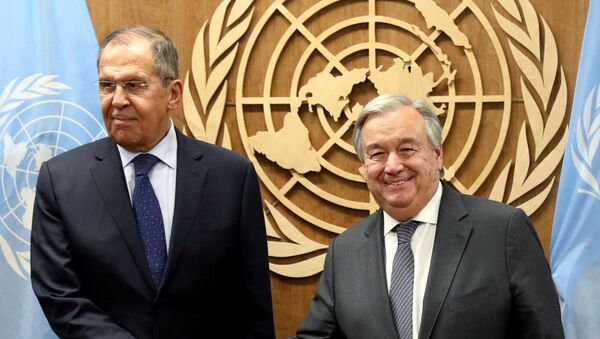The 74th session of the UN General Assembly had all the attributes of a thriller movie, including shocking climate change speeches and the suspense of the Trump-Zelensky phone call scandal which could easily evolve into a lengthy impeachment sequel.
The transcript of the Trump-Zelensky phone call, in which the US president allegedly asked the Ukrainian leader to probe political rival Joe Biden and his son, emerged right after the US commander-in-chief spoke from the UN stage and circulated in the press, practically pushing most UN-related topics out of the US media. Trump’s opponents on Capitol Hill demand his impeachment – a situation in which some compared to what US President Bill Clinton went through in 1998. The Ukrainian leader – a former actor - was surprised by the appearance of a declassified transcript in the media, and, in turn, looked somewhat “out of character” during his meeting with Trump in New York.
"Clinton...had an affair with a White House intern, which is what led Congress to launch its investigation at the time... Monica Lewinsky, the name of the intern,...is now the source of the Ukraine president’s new nickname: Monica Zelensky." https://t.co/kCA4Sx9Mth
— Lia Matera (@liamatera) September 27, 2019
While the main roles in this drama are played by the Trump-Zelensky duo, the situation may eventually affect relations with other politicians mentioned during their July phone call - Angela Merkel and Emmanuel Macron. And while Trump has always played hardball in his negotiations with European leaders, for Zelensky, who entered international politics only recently, the consequences of criticizing Macron and Merkel, are still unclear.
Trump has created a crisis for Zelensky with Merkel & Macron; Zelensky had to try to smooth that over after saying some critical things about them when agreeing with Trump.#RickShow
— Rick Smith (@RickSmithShow) September 27, 2019
For Russia, the 74th UN General Assembly was marked by a diplomatic scandal which may lead to a further deterioration of relations between Washington and Moscow as 10 members of Sergey Lavrov’s delegation did not get their US visas on time, although some, like Senator Konstantin Kosachev, had filed all necessary paperwork well in advance.
For Russian delegation, this year's UN General Assembly was not an easy one: 10 diplomats were basically not allowed to enter the US to attend the international event-a violation of America's intl oblugations. pic.twitter.com/cCTPzjsfzy
— Denis Bolotsky (@BolotskySputnik) September 27, 2019
Despite the unexpected complications, Lavrov held dozens of meetings on the sidelines of the main UN event. On Friday he met with the US secretary of state, Mike Pompeo, and with Chinese foreign minister Wang Yi, as well as with top diplomats from other countries.
Russian FM Sergey Lavrov greeting his Mexican counterpart Marcelo Ebrard Casaubon before sideline talks at the UN HQ. pic.twitter.com/WqMQqCcnPM
— Denis Bolotsky (@BolotskySputnik) September 27, 2019
In his speech at the General Assembly, Russia’s top diplomat again criticized Western nations for adopting a “rules-based order” instead of international law.
At a news conference, when talking about his meeting with Pompeo, Lavrov said that Washington’s reaction to Moscow’s strategic stability initiatives “wasn’t negative”. Yet, when talking about the recent 'visa incident', Russia’s top diplomat slammed the “political class” of the US for igniting anti-Russian paranoia, which may have affected those who failed to issue visas for members of his staff.
Lavrov on Friday talks with Mike Pompeo: Strategic stability, situation in the Middle East, Africa, Syria, Korean Peninsula, as well as bilateral issues were discussed. Russia offered to open additional communication channels. pic.twitter.com/3DDyzwlV1g
— Denis Bolotsky (@BolotskySputnik) September 27, 2019
The 74th session of the UN General Assebly began on Monday with a climate summit and a high-level meeting on health coverage, followed by general debates which will be concluded on 30 September.



